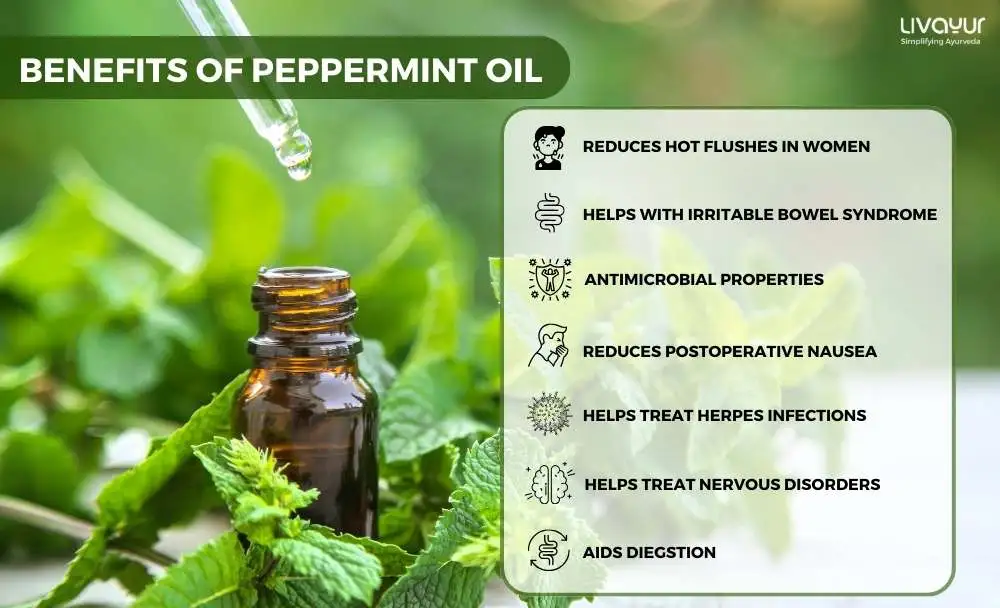This article is reviewed by an expert

Have you ever experienced the benefits of peppermint oil?
Renowned for its invigorating and soothing qualities, peppermint oil is widely used in the treatment of various health ailments. Derived from peppermint leaves, it is readily accessible in multiple forms in the market.
Let’s explore the many health benefits of peppermint oil in detail in this article and integrate this amazing essential oil into our daily routines.
Benefits of Peppermint Oil (1)
Hot Flushes in Women
Primary Benefits: A study observed the effects of peppermint and Neroli hydrosol spray on hot flushes in women undergoing breast cancer treatment. While not meeting the required preference threshold for the standard recommendation, some patients found the spray helpful in reducing hot flush annoyance.
Secondary Benefits: As a result, peppermint oil may help improve the overall well-being and quality of life of women. It may also help provide them with a sense of relief and make their daily activities more manageable and comfortable.
Irritable Bowel Syndrome (IBS)
Primary Benefits: Several studies have been conducted to observe the effect of peppermint oil on people with IBS. However, they all have shown mixed results. But, in many cases, peppermint oil has improved abdominal symptoms in patients with IBS.
Secondary Benefits: As such, peppermint oil may be used in the management of irritable bowel syndrome.
Antimicrobial and Anti-Plasmid Activities
Primary Benefits: Peppermint oil and its main constituent, menthol, demonstrate potent antimicrobial activity against certain bacteria and yeast strains.
Secondary Benefits: The oil also exhibits anti-plasmid action, potentially eliminating resistance plasmids in bacteria.
Postoperative Nausea
Primary Benefits: Inhalation of peppermint oil vapours have shown to reduce postoperative nausea and the need for antiemetic medication following gynecologic surgery.
Secondary Benefits: As a result, peppermint oil can help enhance patient comfort, improve recovery and reduce reliance on antiemetic medications.
Herpes Simplex Virus
Primary Benefits: Peppermint oil has a direct virucidal effect on herpes simplex virus (HSV), including an acyclovir-resistant strain.
Secondary Benefits: Hence, topical use of peppermint oil may be suitable for treating recurrent herpes infections.
Larvicidal and Mosquito Repellent Action
Primary Benefits: Peppermint oil demonstrates potent larvicidal activity against various mosquito species and shows strong repellent action when applied to human skin.
Secondary Benefits: As such, peppermint oil may help prevent several mosquito-borne diseases like malaria, dengue, etc.
Nervous Disorders & Mental Fatigue
Primary Benefits: Peppermint oil is believed to be highly effective in treating nervous disorders and mental fatigue.
Secondary Benefits: Several studies also suggest that it may have psychoactive actions and produce stimulating effects on behaviour.
Indigestion
Primary Benefits: Peppermint oil is known for being a carminative agent that helps alleviate gas.
Secondary Benefits: Hence, adding a few drops of peppermint essential oil to water and consuming it after a meal may help provide significant relief from indigestion.
How To Use Peppermint Oil?

- Blend it with carrier oils and apply it directly on the skin for topical use.
- Use a diffuser to disperse it for aromatherapy purposes.
- Consume it orally in the form of capsules or tablets.
- Create a soothing peppermint tea using dried leaves or extracts.
- Use creams, lotions or mouthwashes made of peppermint oil.
Side Effects & Precautions (1)
Peppermint oil is generally non-toxic and non-irritating when used in low dilutions, but sensitization may occur due to its menthol content. An overdose of peppermint oil can sometimes cause skin irritation, slow or rapid breathing, abdominal pain, diarrhoea, nausea, vomiting, blood in urine, convulsions, depression, dizziness, twitching, unconsciousness, uncoordinated movement and flushing. Therefore, it is recommended to use peppermint oil in moderation and only after consulting a healthcare professional.
Additionally, pregnant women and people with hiatal hernia, gallbladder disease, bile duct obstruction and severe liver damage are also recommended to avoid using peppermint oil.
There have also been some reported cases of menthol addiction, acute lung injury and fulminant pulmonary oedema after using peppermint oil.
The Final Takeaway
Peppermint oil offers a wide range of benefits that can positively impact your well-being. From reducing hot flush annoyance in women to aiding in the management of irritable bowel syndrome, peppermint oil can be used for various medicinal purposes.
However, it’s crucial to be aware of the potential side effects of peppermint oil and use it in moderation only after seeking professional advice.
FAQs
- Can peppermint oil be ingested directly without dilution?
It is not recommended to ingest peppermint oil directly. It is safer to consume it orally in the form of capsules or tablets or by using its leaves to create a peppermint tea.
- How should peppermint oil be stored?
Peppermint oil should be stored in well-filled, tightly-closed, light-resistant containers in a cool place. This helps maintain its quality and potency (1).
- What is the recommended dosage for peppermint oil?
The dosage of peppermint oil varies depending on the intended use. It is best to consult a healthcare professional to determine the appropriate dosage. However, generally, 6-12 drops are recommended for internal use, and 3-4 drops in hot water are recommended for inhalation (1).
Disclaimer: The information provided here is for general information and not meant to substitute any medical advice. Please consult your doctor for appropriate medical consultation.

















